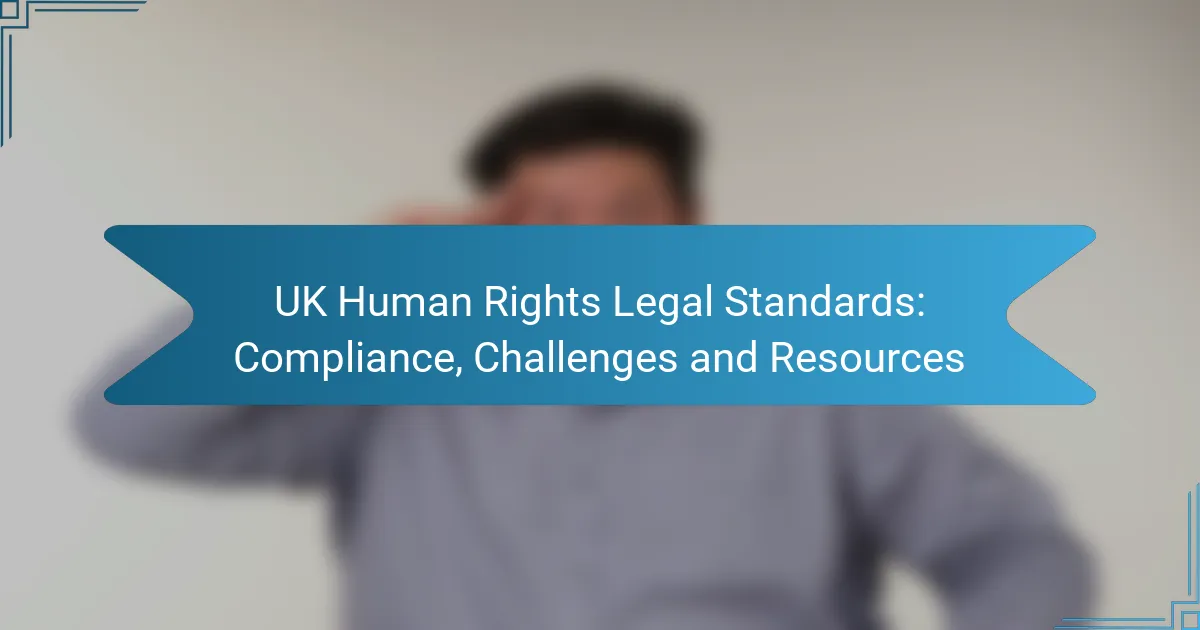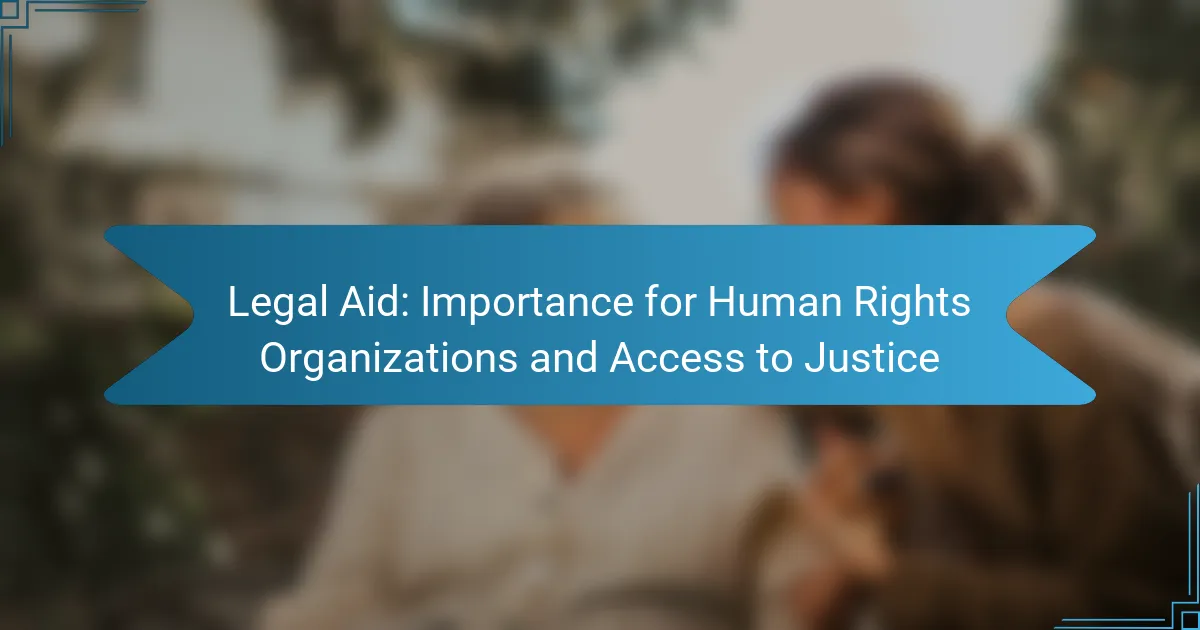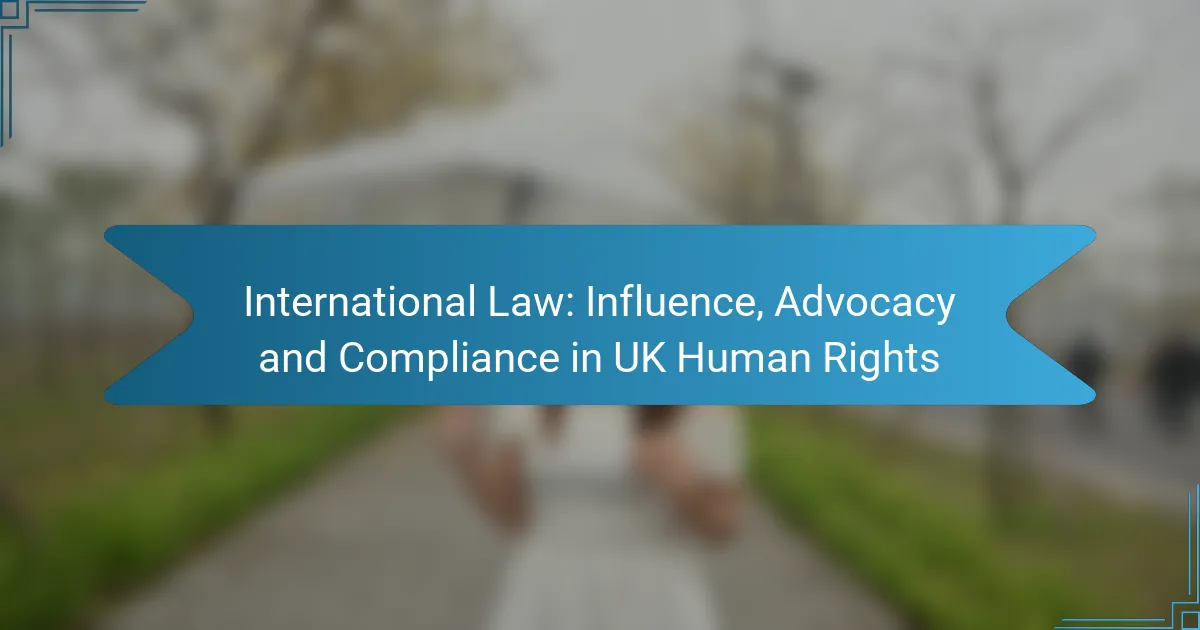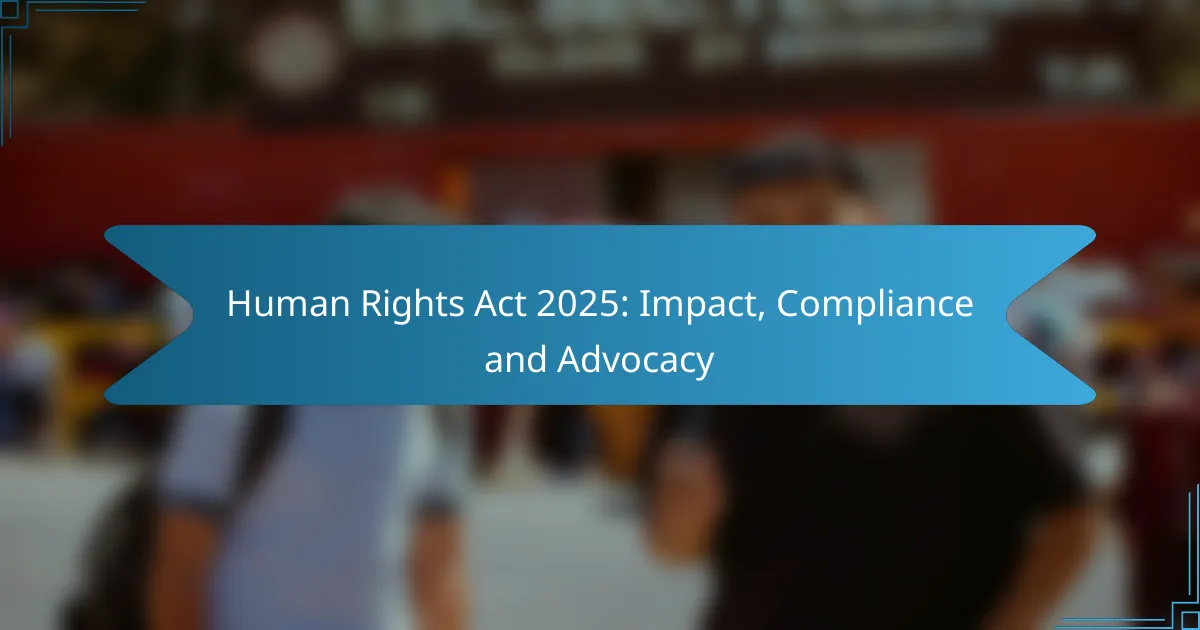The UK human rights legal standards are primarily outlined by the Human Rights Act 1998 and the European Convention on Human Rights, among other legal frameworks. Compliance with these standards requires ongoing evaluation and training, while organizations often encounter challenges such as limited resources and a complex legal landscape. Understanding these elements is crucial for effectively safeguarding individual rights and freedoms within the UK.
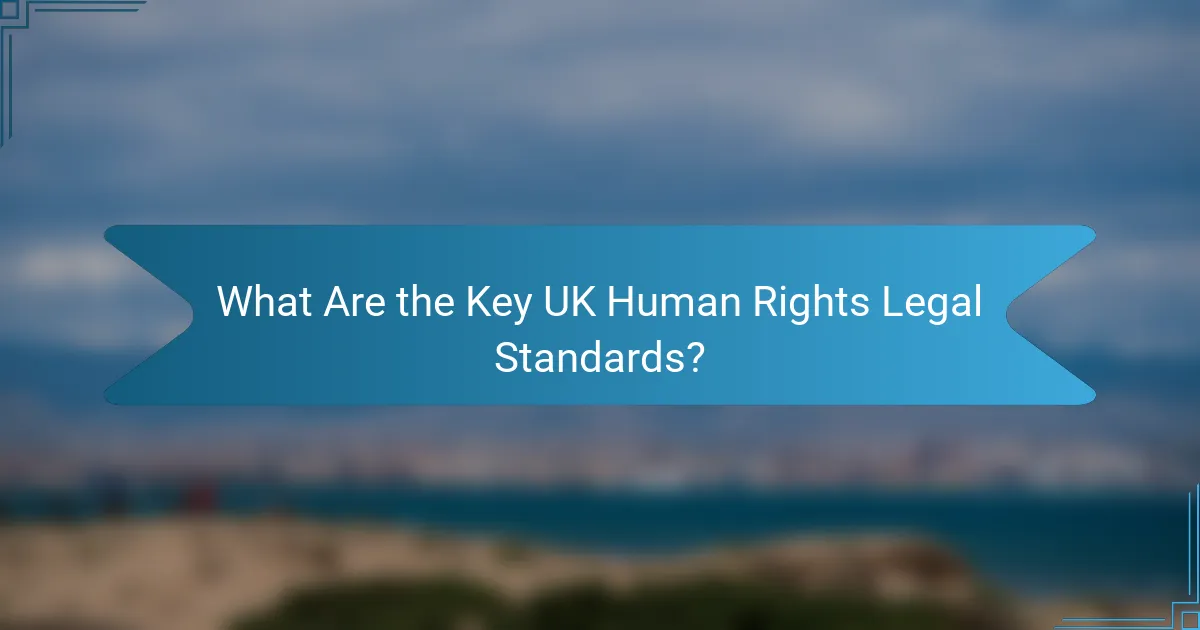
What Are the Key UK Human Rights Legal Standards?
The key UK human rights legal standards are primarily defined by the Human Rights Act 1998, the European Convention on Human Rights, common law principles, and various international treaties. These standards establish the framework for protecting individual rights and freedoms within the UK legal system.
Human Rights Act 1998
The Human Rights Act 1998 incorporates the European Convention on Human Rights into UK law, allowing individuals to seek justice in UK courts for violations of their rights. It covers a range of rights, including the right to life, the right to a fair trial, and the right to privacy.
Individuals can bring cases against public authorities if they believe their rights have been infringed. However, the Act does not provide an absolute guarantee of rights, as limitations can be placed on certain freedoms in the interest of public safety or national security.
European Convention on Human Rights
The European Convention on Human Rights (ECHR) is an international treaty that protects human rights and fundamental freedoms in Europe. It serves as the foundation for the Human Rights Act 1998 and outlines various rights, such as freedom of expression and the prohibition of torture.
UK courts must interpret and apply laws in a way that is compatible with the ECHR. If a case is taken to the European Court of Human Rights, the UK may be required to comply with its rulings, which can influence domestic law and policy.
Common Law Principles
Common law principles in the UK provide a foundation for human rights protections through judicial precedents and legal interpretations. Courts often rely on established case law to determine the application of rights in specific situations.
Judges can interpret statutes in light of human rights principles, ensuring that legislation aligns with the protection of individual freedoms. However, common law can be less predictable than statutory rights, as it evolves through court decisions over time.
International Treaties
The UK is a signatory to various international treaties that promote human rights, including the International Covenant on Civil and Political Rights and the Convention on the Rights of the Child. These treaties obligate the UK to uphold certain standards and report on their implementation.
While international treaties do not automatically become part of UK law, they can influence domestic legislation and policy. Awareness of these treaties is essential for understanding the broader context of human rights protections in the UK.
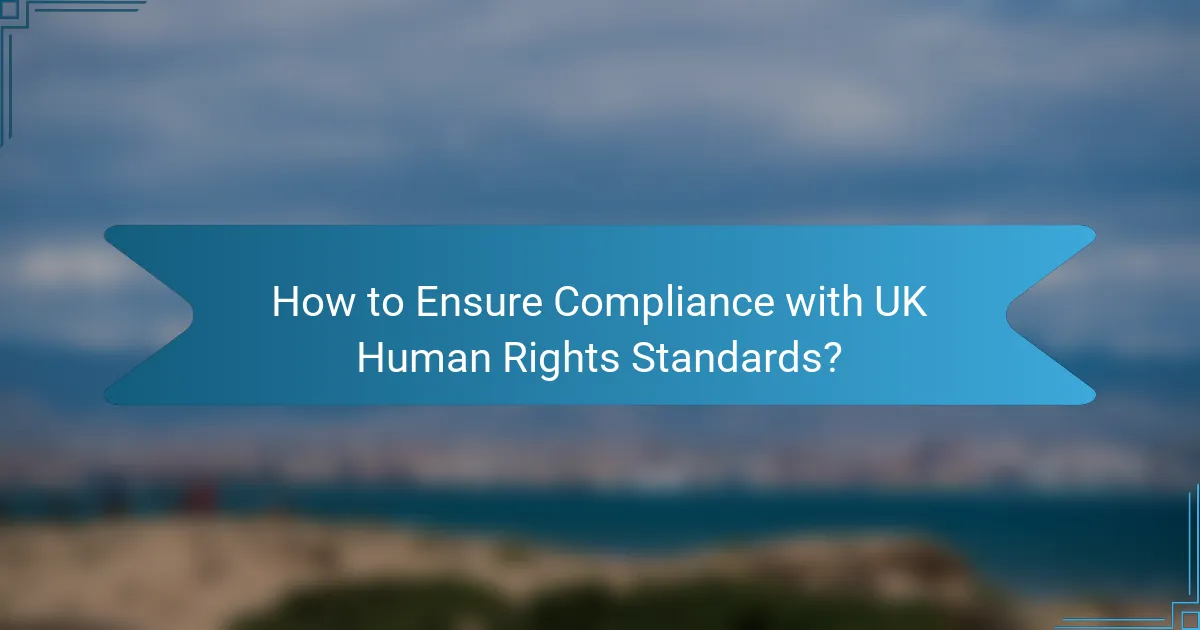
How to Ensure Compliance with UK Human Rights Standards?
Ensuring compliance with UK human rights standards involves systematic approaches that include regular evaluations, staff training, and robust policy frameworks. Organizations must actively monitor their practices and educate their teams to uphold these essential rights effectively.
Regular Audits and Assessments
Conducting regular audits and assessments is crucial for maintaining compliance with human rights standards. These evaluations should focus on identifying gaps in practices and ensuring that policies align with legal requirements. Aim to perform these audits at least annually, but more frequent assessments may be necessary in high-risk environments.
Utilize both internal and external auditors to gain diverse perspectives. Internal audits can help identify immediate issues, while external assessments provide an objective view of compliance and best practices.
Training and Awareness Programs
Implementing training and awareness programs is essential for fostering a culture of respect for human rights within an organization. These programs should be tailored to the specific roles and responsibilities of employees, ensuring that everyone understands their obligations under UK law.
Consider using a mix of in-person workshops and online training modules to accommodate different learning styles. Regular refresher courses can help keep human rights issues at the forefront of employees’ minds.
Policy Development and Implementation
Developing and implementing comprehensive policies is a foundational step in ensuring compliance with human rights standards. Policies should clearly outline the organization’s commitment to human rights, detailing procedures for reporting violations and addressing grievances.
Engage stakeholders in the policy development process to ensure that diverse perspectives are considered. Once policies are in place, communicate them effectively and monitor adherence to foster a culture of accountability.
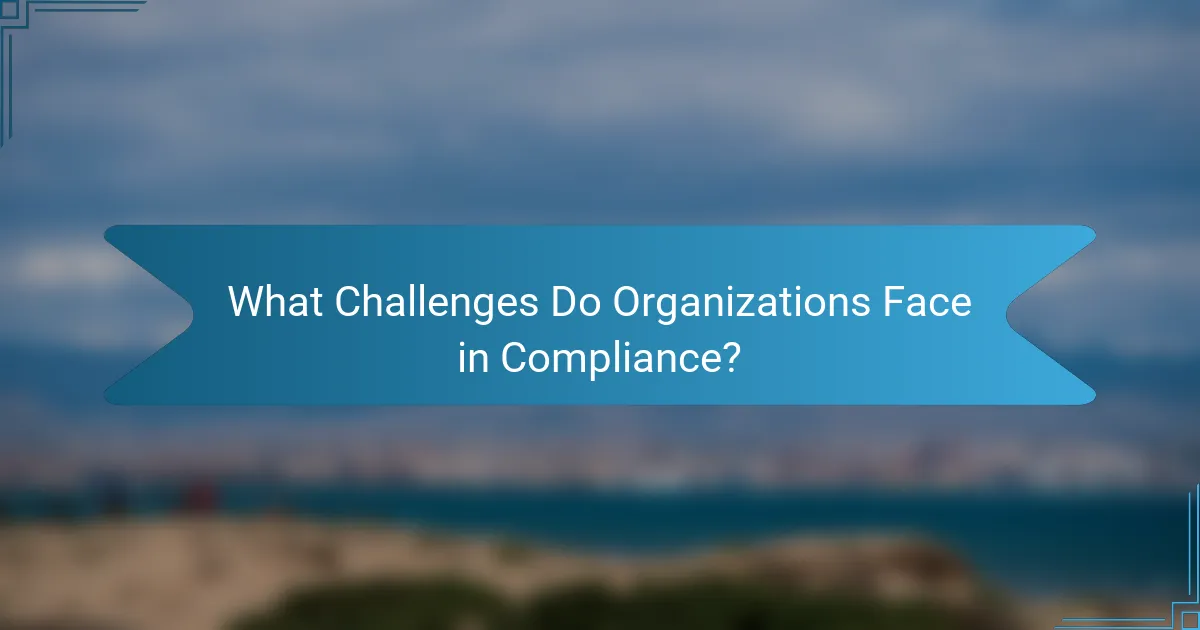
What Challenges Do Organizations Face in Compliance?
Organizations in the UK face several challenges in ensuring compliance with human rights legal standards. These challenges include a lack of awareness, resource constraints, and the complexity of the legal framework.
Lack of Awareness
A significant barrier to compliance is the lack of awareness among organizations regarding human rights obligations. Many organizations may not fully understand their responsibilities under UK law or international standards, leading to unintentional violations.
To address this, organizations should invest in training and awareness programs for their staff. Regular workshops and informational resources can help ensure that employees at all levels are informed about human rights issues relevant to their operations.
Resource Constraints
Resource constraints often hinder organizations’ ability to comply with human rights standards. Limited budgets and personnel can restrict the implementation of necessary policies and practices.
Organizations should prioritize human rights compliance within their budgets, potentially reallocating funds from less critical areas. Seeking partnerships with NGOs or leveraging pro bono legal assistance can also help mitigate resource challenges.
Complexity of Legal Framework
The complexity of the legal framework surrounding human rights can be daunting for organizations. Navigating various laws, regulations, and international treaties requires specialized knowledge that many organizations may lack.
To simplify compliance, organizations can consult legal experts or human rights specialists who can provide guidance tailored to their specific context. Developing a clear compliance strategy that outlines key legal obligations can also help organizations manage this complexity effectively.

What Resources Are Available for Understanding Human Rights?
Numerous resources exist to help individuals comprehend human rights in the UK, ranging from government documents to support services. These resources provide essential guidance, legal assistance, and advocacy to ensure rights are understood and upheld.
Government Guidance Documents
The UK government publishes various guidance documents that outline human rights standards and legal frameworks. These documents are crucial for understanding rights under the Human Rights Act 1998 and other relevant legislation.
Key documents include the “Human Rights Framework” and “Guidance on the Human Rights Act,” which detail the responsibilities of public authorities and the rights of individuals. Accessing these documents online is straightforward, often available on official government websites.
Legal Aid and Support Services
Legal aid is available in the UK to assist individuals who cannot afford legal representation in human rights cases. Eligibility for legal aid typically depends on income and the nature of the case, with many services offering free initial consultations.
Support services, such as the Legal Aid Agency, provide information on how to apply for legal aid and what types of cases qualify. Additionally, community legal clinics may offer assistance in navigating human rights issues.
Human Rights Organizations
Numerous non-governmental organizations (NGOs) focus on human rights advocacy and education in the UK. Prominent organizations include Amnesty International and Liberty, which provide resources, legal advice, and support for individuals facing human rights violations.
These organizations often run campaigns, publish reports, and offer workshops to raise awareness about human rights issues. Engaging with these groups can provide valuable insights and support for individuals seeking to understand or assert their rights.
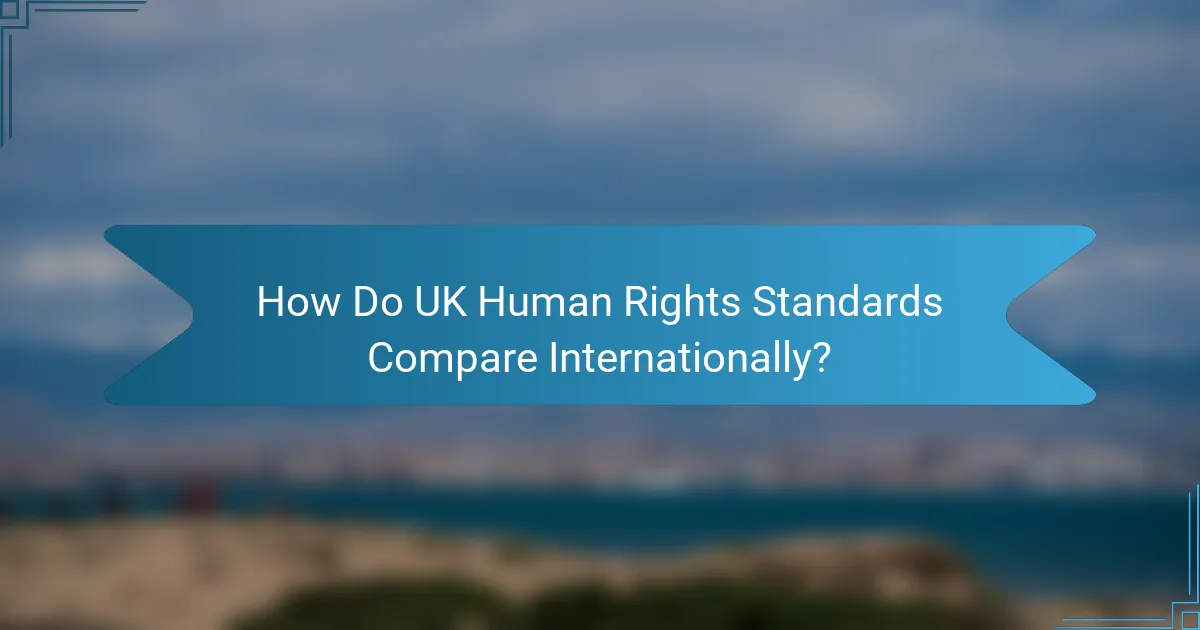
How Do UK Human Rights Standards Compare Internationally?
The UK human rights standards are generally aligned with international norms but face unique challenges in implementation and compliance. While the UK has robust legal frameworks, differences in interpretation and enforcement can lead to variances in human rights protection compared to other countries.
Comparison with EU Standards
The UK human rights standards, particularly under the Human Rights Act 1998, were heavily influenced by the European Convention on Human Rights (ECHR). Post-Brexit, the UK retains many of these principles, but there is ongoing debate about diverging from EU standards, especially regarding the right to privacy and freedom of expression.
While the EU emphasizes collective rights and social protections, the UK often prioritizes individual liberties. This can create tensions, particularly in areas like asylum and immigration, where the UK has sought to implement stricter controls compared to EU norms.
Global Human Rights Frameworks
Globally, human rights standards are guided by frameworks such as the Universal Declaration of Human Rights and various UN treaties. The UK is a signatory to many of these agreements, which obligate it to uphold certain rights, including those related to civil liberties and social justice.
However, the UK’s approach can differ from other nations, particularly in enforcement. For instance, while some countries may have strong legal protections for economic and social rights, the UK has focused more on civil and political rights. This distinction can impact how rights are realized in practice, leading to disparities in protection and access.

What Are the Future Trends in UK Human Rights Law?
Future trends in UK human rights law will likely focus on adapting to societal changes, technological advancements, and evolving legal precedents. As the landscape shifts, compliance with international standards and addressing emerging challenges will be crucial for maintaining human rights protections.
Emerging Legal Precedents
Emerging legal precedents in the UK are shaping the interpretation and application of human rights law. Recent court decisions have highlighted the importance of balancing individual rights with public interests, particularly in areas such as privacy and freedom of expression.
For instance, cases involving the right to protest and the use of surveillance technology are setting new benchmarks for how rights are protected. Legal professionals should stay informed about these developments to effectively navigate the evolving landscape.
Impact of Technology on Human Rights
Technology is significantly impacting human rights in the UK, raising both opportunities and challenges. The rise of digital surveillance, data privacy issues, and online hate speech necessitates a careful examination of existing laws and their adequacy in protecting rights.
As technology continues to evolve, it is essential for policymakers and legal practitioners to consider how innovations like artificial intelligence and social media platforms affect human rights. Engaging in discussions about ethical standards and regulatory frameworks will be vital for ensuring that technology serves to enhance rather than undermine human rights.
